- Home
- J. M. Redmann
The Girl on the Edge of Summer Page 24
The Girl on the Edge of Summer Read online
Page 24
Samuel mentioned the War, the first one, the Navy insisting the District be closed, if New Orleans was to be a naval base. In 1917 Storyville ended.
The people I had come to know through his diaries dispersed, and their names did not appear again. Instead, he told the love story of his life with Alibe (he several times mentioned it needed to be pronounced Ollybay and his last name Braud was Bro). She left teaching for the birth of their first children, a set of twin girls. Praise the Good Lord, Mother and Children are well and healthy. A blurring of the letters as if water—tears?—fell on them.
Another child, also a girl. And again his diary recorded joy, not disappointment in no son. Their fourth child was a boy. Again, happiness that both mother and child were well. This is true courage, that my sex are not good at admitting, our shouts of battle are nothing to carrying of life at the risk of our own life and the pain and worry it takes to bring another being to the world.
He continued as a policeman, rising in the ranks until, as he said, I am higher than I ought to be, much higher than I want to be, but the money is good for our growing family, and that is more important than any fleeting wish on my part to be back on the street with Luke Summit. Paper will be my life, and the fellows can tell me jolly tales of their adventures with miscreants over a pint.
In all they had seven children, five girls and two boys. All healthy and well.
When women got the right to vote, he insisted Alibe take advantage of it. The laws affect her equally. Why should she not affect them as well?
I started skipping through it, the stories of the children and their school, his tedious paperwork and meetings. Certainly a life well lived, but after the tenth A in grade school, my attention wandered. I skimmed over the kids growing up—they all did well in school, some of them even going to college, two of the girls and one boy. Smart like their mother, he wrote on accompanying his oldest daughter to Newcomb College.
After thirty years in the police force, he retired. They moved to a smaller cottage in the Garden District, closer to the river and away from the grand mansions of St. Charles. Their children were grown and away with children of their own. The oldest daughter had never married, had gone on to medical college and was a doctor in New York. Tried not to read much into that.
I glanced at my watch. It was close to closing time. Just for the sake of finishing what I started, I wanted to get to the end, to find out what had happened to Samuel Braud.
As I scanned the pages, I saw a familiar name.
Augustine Lamoureaux. The entry was from November of 1943. Another war had come to the world. A quick calculation put him in his mid-sixties. Almost forty years after I had first met them on these pages.
I often walk alone these days. Alibe accompanies me when she can, but her knees are not able to manage the long rambles that are my solace. I was revisiting my old haunts, streets I walked as a vigorous young man, thinking I could right so many wrongs of the world. I found myself on Basin Street, the houses of sin torn down, now to be houses for the impoverished, to give them a safe, comfortable place to live. I wonder at that concentration of desperation, but better minds than mine have thought this through, so the buildings go up. In this contemplative mood, I noticed a figure down the street, leaving from the cemetery. Decades at least had passed since I’d seen her, but her erect carriage, the fine-boned face, even as it aged, showed it to be no other than Augustine Lamoureaux.
“Miss Lamoureaux,” I called. She turned, started, as if seeing a walking ghost.
“Mr. Braud,” she said. She always pronounced my name correctly. “You still walk these streets?”
“I walk to keep walking,” I said as I approached her. “I don’t want my bones to get out of the habit of movement. At my age, they may not get started again. And you, Madame? Are you also visiting the old haunts?”
She smiled a sad smile. “No, I have no desire to live in the past, save for some fond memories. I was here visiting a friend in the only place I can visit her.”
“Ah, yes, we are of the age we visit graves. I am sorry for your loss.” It was a loss, I could see by her face a lingering sadness, one to long outlast the funeral.
“Thank you, Mr. Braud, that is kind of you.”
“I do not mean to intrude on your grief, but I often wondered what happened to those who lived in the District. You, Miss Beaudoin, Teddy, the stable…hand, Rob Byrnes of the rosy cheeks, Michelle Gierden, who played the piano so beautifully, Josie, Alice, the others.”
She was silent. I wondered if I had breached decorum by asking such questions. For all I knew, Miss Lamoureaux had moved on from her life in the District, shirked off its taint.
I turned to walk with her, to give her time to reply if she so chose. Or to let me know that the past was gone and we should talk of the weather, the winter chill from the river.
“So long ago,” she said softly. “Do you want the good or the bad first?”
“Perhaps a mix, to soften the blows.” I proffered my arm for her. After a moment’s hesitation, she took it.
“Rob Byrnes sold one of his fanciful stories to one of those magazines he liked to read, the ones about crime and detectives. It did well and he sold more, enough to move to New York City and live there. He writes faithfully once a month—”
“He is still with us?”
“Yes, says the wine of his youth has preserved him into his dotage. And sends a check, claiming it is for all the coffee and soup we fed him when he had nothing.” She stopped, opened her purse, and took from it a photograph. A well-dressed man amid the lights of Broadway. I barely recognized him other than the eyes, the same glint of humor. “He sent this to me last month. He is still writing his stories, living a comfortable life amidst the Bohemians of New York. He promises he will visit in the spring before it gets too hot.”
“That is good news, I am happy for him. I had suspected it was his grave you were visiting.” With one last look, I handed the photo back to her.
“Michelle Gierden is still playing the piano. The war gave her new chances to play with so many men overseas. She sends postcards. I saw her about five years ago when she last played here.”
“Ah, that is good to know. I’d love to hear her play again.”
“The last I heard, Teddy and Josie headed west to California. Neither of them were writers, a few postcards. Teddy found work with the horses they used in the movies. Someone needed to train them, and she was always good with the animals. Josie worked as an actress, small parts, in the crowds. I saw her in one years ago, keep looking for her face in the crowd when I go to the cinema. But of course, she would no longer be the pretty young girl she was then. I believe Teddy found happiness, a little house by the sea, a place where all that mattered was her skill with horses. Teddy sent a postcard of the ocean, said that was her view and that Josie had married an auto mechanic and moved up the coast.”
“Teddy was—is—good with horses.” We spoke in the past tense, but like Rob, she could still be with us, enjoying her usual toddy in the evening. We both chose to leave it at that.
“The sad ones. Alice was caught in the yellow jack run that summer of 1906. One of the last to succumb. In her fever, she said to me, ‘at least I’ll be pretty in heaven.’ She knew she would die young.”
“I’m sorry,” I said. “Her life was not going to be an easy one, no matter what.”
“No, it wasn’t. We called them the girls on the edge of summer, always ready to fall into the suffocating heat, the fevered miasmas that seemed to follow the rising of the temperature, the slow summers with no trade save the desperate or despicable. Everyone who could be gone from town had left. They held on to spring and hoped for the fall. So many of them were lost in the summer.”
I could merely repeat, “No, they did not have easy lives.”
“Thrown away, left to survive on their own. You were one of the few police to consider that a crime could be committed against those girls.”
“Yes, the blasting,
wet heat, inescapable, so miserable for us all. I regret I could do little more.”
“Luke Summit, you trained him and his colleagues well. They also listened to us.”
“I trained them to treat you and your friends as their allies. Not just the uptown gentlemen were the ones most hurt by misdeeds. You helped me solve crimes that would have otherwise gone unsolved.”
“I helped with the ones who would prey on the weak and the fallen.”
“Yes, I did notice you weren’t forthcoming when the uptown men had their wallets taken.”
“Perhaps they dropped them in a drunken stupor and chose to blame those they could get away with blaming.”
“Perhaps. I see you and I will not agree on this.”
“Perhaps the contents of the gentleman’s wallet, plenty for his evening’s pleasure, was enough to see a girl through the summer when few people came calling.”
“Miss Lamoureaux, I have always admired you for your morals.” At the look on her face I added, “No, I am not mocking you. The rich could fend for themselves; you took care of the poor. The soup, the coffee, the kindness, the blind eye to acts of desperate survival that hurt those who could best afford it. Perhaps not agree, but admire.”
“Thank you, Mr. Braud. We tried to live as best we could, letting kindness and compassion be our guides.”
“I’m guessing it was the case with Frederick Townson,” I said.
She looked off in the distance, maybe seeing the buildings that had been torn down for progress, the people who once lived there.
“The murders stopped after he died,” I said.
She looked at me but still said nothing.
“The young women working in the District. A brute horrifically violated them—”
“Yes, I remember. The youngest, the most desperate. He hunted them.”
The rustle of movement intruded. It was closing time. I would have to return to read the rest. I could call it doing work for Douglas Townson, but it was for myself. I hastily packed up, not wanting to be one the dawdlers who forced the library staff to work late.
As I exited, I paused long enough to text Brandon, asking him to call me even as I was telling myself I was not the confused teenage boy whisperer. At least over the phone, I could give him some kind of heads-up to stay in and do his homework.
He didn’t reply.
I headed for my car.
No groceries had been bought in the last few days, so I defaulted on stopping by Riley & Finnegan. Tomorrow—or next week—a greater intake of salad would begin.
Mary Buchanan was at the door. She tagged me as I walked in.
“Underage or not? They have IDs that say they’re old enough, but they don’t look it. Or I’m turning into a grumpy old lady.”
“You could never be grumpy.” I looked at the group she indicated. Alan, the young Goth girl, ah, Sophia and her friend from the pizza place, whose name I had no chance in hell of remembering.
Like it or not, I was going to have to be the teenage-don’t-do-stupid-things whisperer.
I sauntered over to their table just as the waiter put their beers on it. Reaching over Sophia’s shoulder, I snatched the one from in front of her.
She looked up, annoyed, then abashed.
I shook my head, then took a sip of the beer.
“Thanks for buying this for me. I know you weren’t buying it for yourself since, no matter what your fake IDs claim, you’re not old enough to drink.”
Alan looked sheepish as he corralled the beer in front of the other girl, taking it for himself.
“You don’t have a right to tell us what to do,” Sophia said. She was dressed all in black, including black fingernails and black lipstick. Her hair was such a uniform black it probably had to be dyed. And a black X cross around her neck. Charming.
I took another sip of her beer. “In this case, yes, I do. If you want to break the drinking laws, do what I did, get the one legal person to buy a six-pack and head out to the levee and drink there. That way, Mary doesn’t lose her license and get put out of business.”
To prove I wasn’t going to be nice and leave them alone, I pulled up a chair and sat down. And took another sip of her beer.
“I’m sorry,” Alan said sheepishly. “We’re just trying to…”
“Take care of Janice,” Sophia finished for him.
Ah, Janice, that was her name.
“I’m fine,” Janice interjected in a vehement enough tone to tell me she wasn’t. But whether it was a crush who hadn’t texted her back or something real was impossible to tell. She was more conventionally dressed: jeans that were ripped before they were sold, an upscale pink T-shirt, patterned with rhinestones and stitching that would not look good after a few washings. Pale pink nail polish, the kind her mother would approve of, although her lips were a deeper red than her age could carry. Her hair was brown but had blond highlights, but again ones her mother probably approved of. They might even have gone to the same hairdresser.
The figure I’d seen at the garage, the one led into the truck.
No, it can’t be. I had nothing more than a vaguely female shape in the glare of the lights. Average height. Enough shape to be a woman, but not overly endowed. That could be just about any female in this bar. Including me.
And the other shadowy figure, the short one with the glint of glasses? Brandon still being the computer water boy? Eddie had liked to prey on the young and vulnerable, like Tiffany. He might have taught his meth-head friends his dirty tricks—or learned from them. Maybe they were still using Brandon.
Time to stir the shit. “What about your other friends, the ones I met at the pizza place?”
“What about them?” Sophia said, fuck-you dripping off her tone.
“Brandon and, uh…Kevin. Where are they?”
“Not here.” Again Sophia answering. “What do you want?” she challenged.
“To sit here long enough to ensure you order an age-appropriate beverage.” Still stirring, I continued, “Why are you so reluctant to talk about your friends? I met them, know who they are. Just asking a common question.”
“They’re straight, don’t feel comfortable here,” Alan said.
“They’re clearly not here. Just wondering where they are.”
“Why do you care?” Sophia shot back at me.
“Because you seem so bothered by me asking. Are they at the garage by the airport? The place Eddie used to party?”
“No! You can’t know about that!” Janice burst out.
“Were you there a couple of nights ago?”
“No! Why would you think that!” she replied. “I’ve never been there!”
“Then how do you know about it?”
“I told her,” Sophia said.
“Wait, what garage? What are you talking about?” from Alan.
“Eddie’s former party place, now taken over by his cohorts,” I explained. “How do you know about it?” I asked Sophia.
“Kevin told me. Said I could make a lot of money.”
“How?” I asked.
She looked at Janice, got no response, and then looked back at me. “Said all I needed to do was show my tits. Let them take a few pics.”
“Did you?”
“No!” with enough disgust in her voice to make me think she hadn’t.
“Did you?” I turned to Janice, wondering what that look had been about.
“No. I told you, I’ve never been out there.” She looked at me as if trying to convince me she was telling the truth; I held it long enough for her to look away.
“Why?” Sophia challenged. “You interested?”
“Alcohol isn’t all you’re underage for. No. I’m attracted to women, not adolescent girls.” Reminding them of their age wasn’t a crowd pleaser. To keep us on track, I asked, “What else did Kevin tell you?”
“Nothing. He saw I wasn’t interested and shut it down.”
Just as she was trying to shut down this conversation.
“Look, this
is a murder investigation. Someone killed Eddie Springhorn. If you know anything about—”
“I heard it was you,” Sophia threw out.
“Your sources aren’t very good,” I retorted. “Only very wrong. Eddie and I weren’t best buds, but I didn’t know him or hate him enough to kill him.”
“Why do you think we know anything?” she said.
“What did Tiffany tell you about him?”
“Nothing—” Sophia.
“He was using her—” Janice.
Again, they exchanged a look. Janice hesitated, then said, “She told me what he was doing. If I’d known how desperate she was…those awful pictures…” She started crying.
Both Alan and Sophia tried to comfort her, Alan awkwardly patting her on the back, Sophia putting an arm around her shoulder and glaring at me. Ah, body language, it can speak so loud. Sophia had a major crush on Janice and was taking on the role of dragon-slayer knight. Janice, however, was leaning toward Alan. Everything about her screamed straight girl; even the hardcore lipstick lesbians didn’t play the damsel in distress the way she was. But she was interested in Alan, and he was only trying to be nice and gay-boy supportive to his dead sister’s young friends.

 Not Dead Enough
Not Dead Enough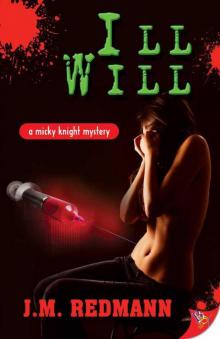 Ill Will
Ill Will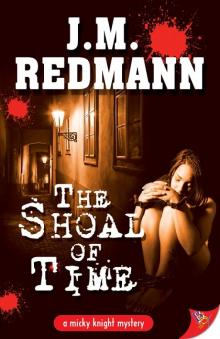 The Shoal of Time
The Shoal of Time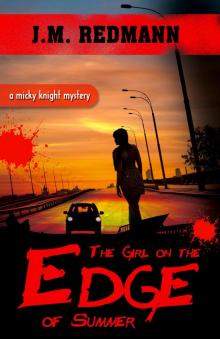 The Girl on the Edge of Summer
The Girl on the Edge of Summer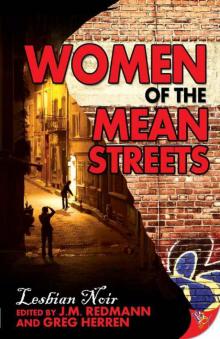 Women of the Mean Streets
Women of the Mean Streets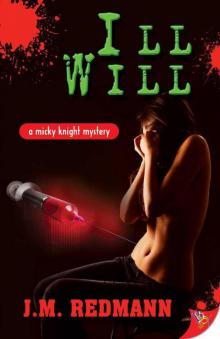 J.M. Redmann - Micky Knight Mystery 7 - I'll Will
J.M. Redmann - Micky Knight Mystery 7 - I'll Will